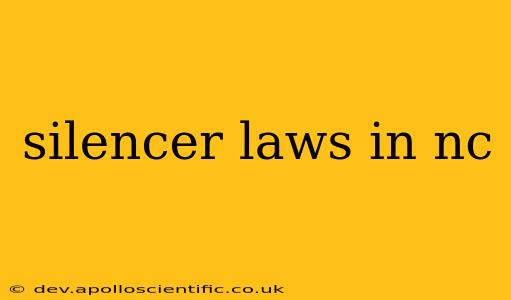North Carolina's laws regarding firearm silencers, often called suppressors, can be complex. This guide aims to clarify the legal landscape for responsible gun owners in the state. Understanding these regulations is crucial for compliance and safe firearm handling.
What are the Key Regulations Regarding Silencers in NC?
North Carolina treats silencers similarly to firearms. This means they are subject to significant regulations under both federal and state law. Key aspects include:
-
Federal Regulations: The primary governing body is the Bureau of Alcohol, Tobacco, Firearms and Explosives (ATF). Federal law requires a thorough background check and registration through the ATF National Firearms Registration and Transfer Record (NFRTR) for any silencer purchase. This process involves filling out ATF Form 4 and undergoing a background check. This is a mandatory step regardless of state laws.
-
State-Level Requirements: North Carolina doesn't have any additional state-level restrictions on the possession of silencers beyond those already imposed by federal law. However, this doesn't mean there are no relevant state laws.
-
Local Ordinances: It's crucial to check with your local municipality for any potential city or county ordinances that might place further restrictions on silencer ownership or use. These can vary significantly, so due diligence is essential.
Understanding the Differences: Possession vs. Use
While North Carolina doesn't have specific state laws restricting possession, the laws surrounding the use of silencers become more nuanced. The context of their use can significantly impact legality:
-
Hunting: The legality of using a silencer while hunting in North Carolina depends on specific game and hunting regulations. While not explicitly prohibited by state law, it’s advisable to verify with the North Carolina Wildlife Resources Commission to ensure compliance with all relevant hunting regulations for your specific hunting activity.
-
Self-Defense: The use of a silencer for self-defense is generally governed by the same principles as the use of any firearm in self-defense in North Carolina. The emphasis remains on acting within the bounds of justifiable use of force and complying with all applicable state and local laws.
-
Other Activities: Using a silencer for any activity that violates other state or federal laws is, of course, illegal. This includes discharging a firearm in a prohibited location or engaging in any other criminal activity.
Penalties for Non-Compliance
Failing to comply with either federal or state regulations concerning silencers can result in severe penalties. These can include:
-
Federal Penalties: Significant fines and imprisonment are possible under federal law for violations of ATF regulations concerning the purchase, registration, and possession of silencers.
-
State Penalties: While state penalties for simply possessing a legally registered silencer are generally not significant in North Carolina, using a silencer in a manner that violates other state laws could result in additional charges and penalties.
Staying Informed: Resources and Further Information
To stay updated on the latest regulations and avoid any legal issues, consider these resources:
-
Bureau of Alcohol, Tobacco, Firearms and Explosives (ATF): The official website provides comprehensive information on federal regulations concerning firearms and silencers.
-
North Carolina General Statutes: Review the relevant sections of the North Carolina General Statutes pertaining to firearms and hunting regulations.
-
North Carolina Wildlife Resources Commission: Consult the Commission for information on hunting regulations and the use of silencers in hunting activities.
-
Local Law Enforcement: Contact your local law enforcement agency for clarification on any local ordinances or regulations that may apply in your specific area.
Disclaimer: This information is for educational purposes only and should not be considered legal advice. Always consult with a legal professional for advice tailored to your specific situation. Laws are subject to change, so it is crucial to stay informed about any updates to North Carolina's firearm and silencer regulations.

